When it comes to creating beautiful art, selecting the right painting brushes is crucial. The brush you choose can greatly influence the final result of your artwork, from the strokes you use to the texture you create. Whether you’re a beginner or a seasoned artist, understanding the different types of painting brushes and their uses can enhance your creative process. In this blog, we’ll explore various types of painting brushes and provide tips on how to choose the right one for your artwork.
1-Round Brushes
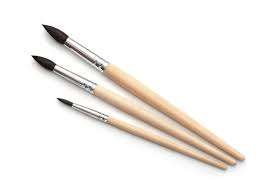
Round brushes are versatile and ideal for creating detailed work, lines, and expressive strokes. They are useful for both broad and fine details, depending on the size of the brush. Smaller round brushes are perfect for intricate lines and detailing, while larger ones can be used for broader strokes and washes.
2-Flat Brushes

Flat brushes are wide and rectangular, making them excellent for creating broad strokes and covering larger areas quickly. They are perfect for painting straight lines, sharp edges, and large washes of color. Flat brushes can also be used for blending and smoothing out paint on the canvas.
3-Filbert Brushes
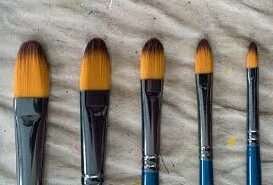
Filbert brushes combine the qualities of round and flat brushes, featuring a flat base with a rounded tip. This shape makes them ideal for creating soft edges, blending, and filling in large areas with smooth transitions. Filbert brushes are often used in portraiture and landscape painting.
4-Fan Brushes
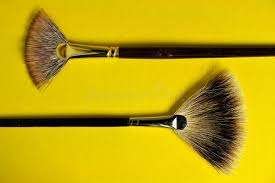
Fan brushes have bristles that spread out in a fan-like shape. They are great for creating soft, natural textures such as grass, fur, or clouds. Fan brushes can also be used for blending colors and creating special effects in your artwork. They’re a favorite among artists for adding a touch of whimsy and texture to their paintings.
5-Angle Brushes
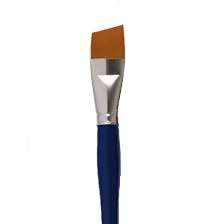
Angle brushes, also known as slanted or chisel brushes, have bristles cut at an angle. This shape allows for precise control and is great for painting sharp lines, edges, and tight corners. Angle brushes are also excellent for creating curves and detailed strokes.
6-Mop Brushes
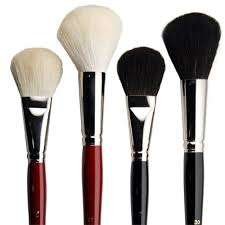
Mop brushes have a rounded, fluffy head, making them perfect for blending and creating soft transitions between colors. They’re often used in watercolor and pastel painting to create washes and smooth gradients. Mop brushes are excellent for softening hard edges and adding gentle textures.
7-Miniature or Detail Brushes
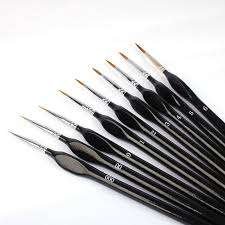
Miniature or Detail brushes, as the name suggests, are perfect for intricate work and fine details. They come in various shapes, including round and flat, and are used to add highlights, fine lines, and other delicate touches to your painting.
8-Liner or Rigger Brushes
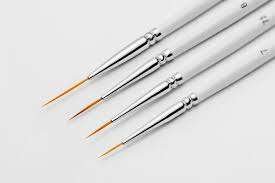
Rigger brushes, also known as liner brushes, are versatile tools used by artists for fine details and long, continuous lines. Their long, slender bristles make them ideal for creating delicate lines, intricate patterns, and precise lettering. Rigger brushes are often employed in watercolors, oils, and acrylics to add highlights, outlines, and other detailed embellishments to artwork.
9-Hake Brushes
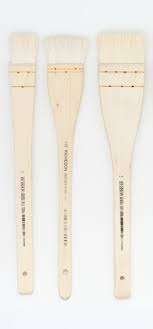
Hake brushes are versatile, wide brushes traditionally used in East Asian painting but also popular in Western art for various purposes. Their soft, absorbent bristles make them perfect for large, smooth washes, blending, and creating broad strokes, particularly in watercolor and ink painting. Hake brushes can also be used for priming surfaces with gesso, applying varnish, or for other large-scale work due to their ability to hold a significant amount of medium.
10-Dagger Brushes
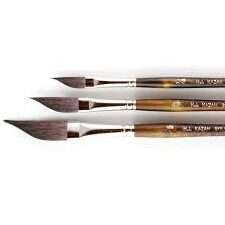
Dagger brushes, also known as sword brushes, have a uniquely angled, tapered bristle design that tapers to a sharp point, allowing for expressive strokes. These brushes excel in creating long, flowing lines, as well as sweeping curves and dramatic, dynamic strokes. They are particularly useful for detailing work such as foliage, waves, and other organic shapes. Dagger brushes are commonly used in watercolor, gouache, and ink paintings for their versatility and ability to produce precise lines and broad strokes with the same brush.
11-Stencil Brushes
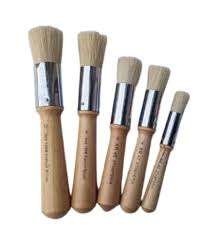
Stencil brushes are designed with short, firm bristles for controlled application of paint through stencils. They are perfect for creating clear, sharp designs on various surfaces, such as fabric, wood, or walls. The brush’s dense bristles help prevent paint from seeping under the stencil, resulting in crisp lines and precise patterns.
12-Scrubber Brushes

Scrubber brushes are used for removing paint or blending colors on a canvas. With their stiff bristles, they are ideal for scrubbing out areas of watercolor, acrylic, or oil paint to create lighter tones or interesting textures. These brushes can also be used for lifting paint to reveal underlying layers, adding depth and dynamic effects to your artwork.
13-Splatter Brushes
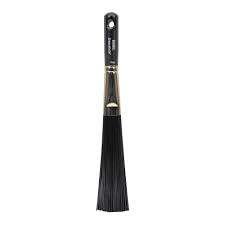
Splatter brushes are used for creating a spattered paint effect in your artwork. They have bristles that can flick paint onto the canvas to produce a variety of splatter, which can add texture and interest to backgrounds or specific areas. These brushes are especially useful for creating abstract effects, stars, or foliage in paintings.
14-Free Style Brushes
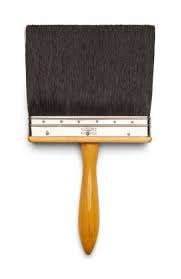
Free Style brushes are versatile tools used in various artistic mediums for their ability to create expressive and dynamic strokes. These brushes often have unique shapes and sizes, allowing artists to experiment with different textures and effects. They are perfect for abstract painting, mixed media, and other projects where creativity and spontaneity are key.
15-Aqua Brushes
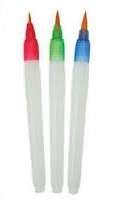
Aqua brushes, also known as water brushes, are a convenient tool for watercolor painting and sketching. They contain a water reservoir in the handle, allowing artists to control the flow of water to the brush tip. This design makes them perfect for on-the-go painting, quick washes, and blending colors seamlessly. Aqua brushes are a great choice for artists who enjoy the freedom and spontaneity of working with water-based media.
By understanding the different types of painting brushes and their uses, you can select the right tools for your artistic vision. Experiment with different brushes to discover your favorites and enhance your painting technique. Happy painting!
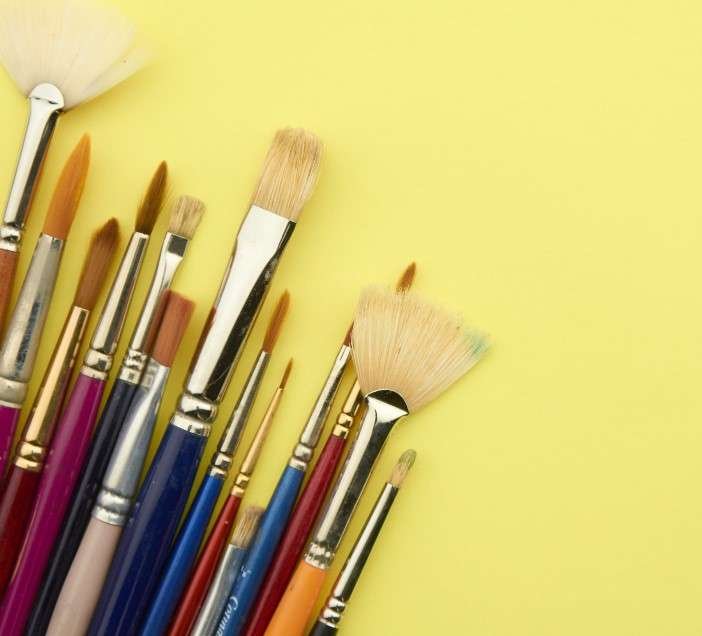
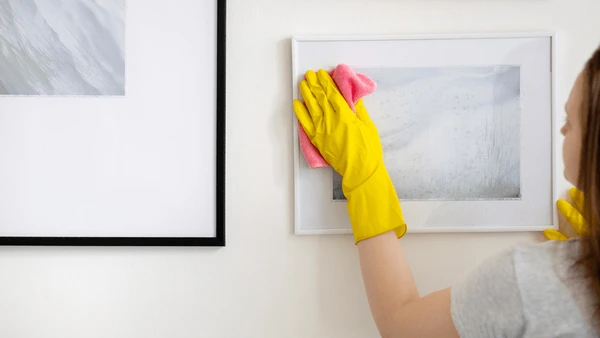
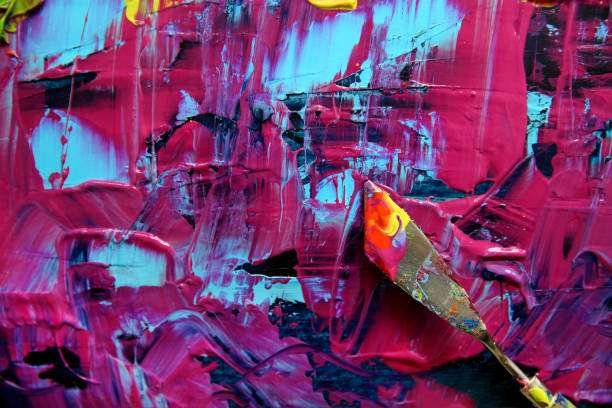
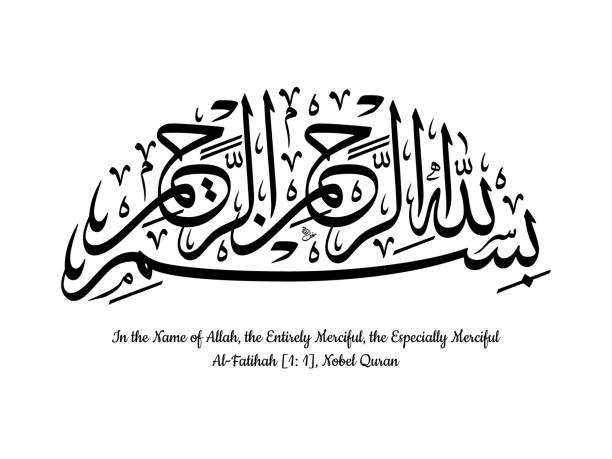
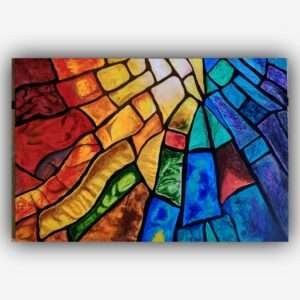
7 Comments
Amazing guide! I’ve always struggled with choosing the right brushes, but now I feel much more confident.
Wah! Ye blog parhne ke baad brush choose karna bohat asaan lag raha hai.
This was such an insightful read! I never realized how much the type of brush can impact the final outcome of a painting.
Main hamesha confused hota tha brush selection mein, lekin ab kaafi clear ho gaya hai. Shukriya!
Bohat hi informative post hai! Ab samajh aya ke brush ka selection kitna zaroori hai art ke liye.
Hello, This blog is a game-changer for beginners like me. Thank you very much.
Thank you for breaking down the different painting brushes so clearly! This will help me make better choices for my artwork 🙂